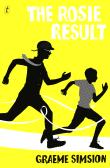 8187654621937118186.jpg
8187654621937118186.jpg
 8187654621937118186.jpg
8187654621937118186.jpg
'I was standing on one leg shucking oysters when the problems began…
'Don and Rosie are back in Melbourne after a decade in New York, and they’re about to face their most important project.
'Their son, Hudson, is having trouble at school: his teachers say he isn’t fitting in with the other kids. Meanwhile, Rosie is battling Judas at work, and Don is in hot water after the Genetics Lecture Outrage. The life-contentment graph, recently at its highest point, is curving downwards.
'For Don Tillman, geneticist and World’s Best Problem-Solver, learning to be a good parent as well as a good partner will require the help of friends old and new.
'It will mean letting Hudson make his way in the world, and grappling with awkward truths about his own identity.
'And opening a cocktail bar.
'Hilarious and thought-provoking, with a brilliant cast of characters and an ending that will have readers cheering for joy, The Rosie Result is the triumphant final instalment of the internationally bestselling series that began with The Rosie Project.' (Publication summary)
 Neurocognitive Interpretations of Australian Literature : Criticism in the Age of Neuroawareness
London
:
Routledge
,
2021
21558011
2021
multi chapter work
criticism
Neurocognitive Interpretations of Australian Literature : Criticism in the Age of Neuroawareness
London
:
Routledge
,
2021
21558011
2021
multi chapter work
criticism
'This unique book on neurocognitive interpretations of Australian literature covers a wide range of analyses by discussing Australian Literary Studies, Aboriginal literary texts, women writers, ethnic writing, bestsellers, neurodivergence fiction, emerging as well as high profile writers, literary hoaxes and controversies, book culture, LGBTIQA+ authors, to name a few. It eclectically brings together a wide gamut of cognitive concepts and literary genres at the intersection of Australian literary studies and cognitive literary studies in the first single-author volume of its kind. It takes Australian Literary Studies into the age of neuroawareness and provides new pathways in contemporary criticism.'
Source: Publisher's blurb.
'No one, including the author himself, would have suspected that a pair of romantic social comedies about a genetics professor with enough creative problem-solving skills to compensate for his maladroit social graces would cause such a publishing buzz. But Graeme Simsion’s previous two Rosie books have garnered local and international attention, bestseller status and the blurbable recommendation of Bill Gates.' (Introduction)
'Genetics Professor Don Tillman is having flashbacks. He’s remembering the time he spent in the principal’s office as a kid in Shepparton, Victoria. The time he spent learning to ride his sister’s bike, much later than was socially acceptable. The time he spent “regarding the majority of the human race as another species”.' (Introduction)
'No one, including the author himself, would have suspected that a pair of romantic social comedies about a genetics professor with enough creative problem-solving skills to compensate for his maladroit social graces would cause such a publishing buzz. But Graeme Simsion’s previous two Rosie books have garnered local and international attention, bestseller status and the blurbable recommendation of Bill Gates.' (Introduction)
'Genetics Professor Don Tillman is having flashbacks. He’s remembering the time he spent in the principal’s office as a kid in Shepparton, Victoria. The time he spent learning to ride his sister’s bike, much later than was socially acceptable. The time he spent “regarding the majority of the human race as another species”.' (Introduction)
 Neurocognitive Interpretations of Australian Literature : Criticism in the Age of Neuroawareness
London
:
Routledge
,
2021
21558011
2021
multi chapter work
criticism
Neurocognitive Interpretations of Australian Literature : Criticism in the Age of Neuroawareness
London
:
Routledge
,
2021
21558011
2021
multi chapter work
criticism
'This unique book on neurocognitive interpretations of Australian literature covers a wide range of analyses by discussing Australian Literary Studies, Aboriginal literary texts, women writers, ethnic writing, bestsellers, neurodivergence fiction, emerging as well as high profile writers, literary hoaxes and controversies, book culture, LGBTIQA+ authors, to name a few. It eclectically brings together a wide gamut of cognitive concepts and literary genres at the intersection of Australian literary studies and cognitive literary studies in the first single-author volume of its kind. It takes Australian Literary Studies into the age of neuroawareness and provides new pathways in contemporary criticism.'
Source: Publisher's blurb.